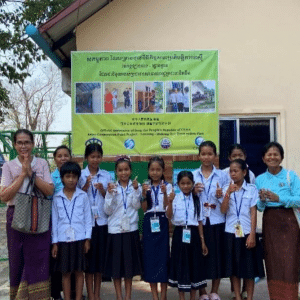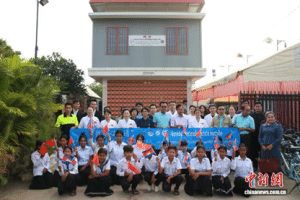Editor’s Note
This article originally appeared on Sixth Tone, as part of a series about life along the Hu line, the imaginary line proposed by geographer Hu Huanyong in the thirties that stretches from Heilongjiang in the North to Yunnan in the South, dividing China into two roughly equal parts. You can find the original here.
YUNNAN, Southwest China — Combing the dry soil with pitchforks, a group of women unearthed the last of the season’s garlic bulbs. They exchanged upbeat banter in their mother tongue, Bai, but their cheerfulness belied the hardships they’ve endured.
In an effort to protect iconic Erhai Lake from harmful agricultural runoff, the government in January announced a ban on cultivating land within a “core area” surrounding the shore. Thousands of farmers have been affected by the regulation, which covers a total of 27,300 mu (1,820 hectares) of farmland.
A farmhand from the western shore of the lake — who belongs to the Bai ethnic minority group native to this part of China — said she used to rely on her own plot of land to feed her family and made extra cash selling the remaining produce at the local market. “But now that I lost my land, I have to spend money on vegetables,” the 49-year-old told Sixth Tone, declining to give her name out of fear of retribution for criticizing the local authorities.
 A 49-year-old farmhand stands in a field in Xizhou County, Yunnan province, May 3, 2017. Colum Murphy/Sixth Tone
A 49-year-old farmhand stands in a field in Xizhou County, Yunnan province, May 3, 2017. Colum Murphy/Sixth Tone
Air, soil, and water pollution have long plagued China, and Erhai Lake hasn’t been spared. The lake — which is vital to the local economy as the scenic backdrop to historic Dali Town, a major tourist destination — was once known for its crystal clear waters, but it has since suffered from heavy pollution. The agricultural waste seeping into the lake from the area’s ubiquitous garlic farms has been identified as the biggest culprit.
The lake has also seen repeated outbreaks of unsightly blue-green algae, first in 1996 and again in 2003. Back then, the water quality was downgraded to Class 4 — the second-worst ranking — meaning it is fit for industrial use but not for direct human contact.
Efforts to clean up the lake started in 2003, and water quality improved once more — but with domestic tourism and agriculture growing in the area, the pressure on the lake only increased. In 2016, 38.6 million tourists visited Dali, up almost 32 percent from the previous year, according to official government figures.
Set against spectacular mountains, the lake is among the key draws for visitors to Dali. The alpine scenery has served as the backdrop for countless engagement and wedding photos, as well as many movies. More and more hotels have popped up near the lake to accommodate visitors, while luxury apartment blocks dot the skyline closer to Dali Ancient Town.
President Xi Jinping also visited the area in 2015 — and remarked on the lake’s water quality. “I hope that when I come back in a few years, the water will be cleaner and clearer,” he said.
But in January, dense blue-green algae once again covered Erhai Lake. Almost 23,000 tons of algae and other overgrowth directly linked to the pollution was removed from the lake between November and March, according to a report from financial publication Caixin Magazine. The situation has gotten so bad that officials have compared the lake to a patient in need of emergency medical attention.
Waste from livestock, sewage, and excessive use of chemical fertilizers on the lake’s surrounding garlic farms were identified as the main contributors to the blue-green algal bloom in a 2013 report from Shanghai Jiao Tong University. Though the phosphorus and nitrogen in wastes and fertilizers are vital nutrients for living creatures, adding excessive amounts to a body of water can cause rapid growth of organisms like green and blue-green algae. These algae can threaten recreational use of rivers, lakes, and seas and can lead to the widespread death of fish and other aquatic life, as they consume the oxygen in the water and block sunlight.
With tourism at risk, local officials were quick to act, drawing up a list of initiatives to clear up the waters of Erhai Lake: Some 4,000 businesses around the lake, including hotels and restaurants, were shuttered earlier this year; all construction work in the area was suspended; and fishing in the lake was banned. Additional measures were put in place to regulate livestock farmers’ handling of cow dung, and farming — including livestock farming in some cases — was banned on land deemed too close to the lake.
 Farm workers dig up garlic bulbs in Eryuan County, Yunnan province, May 4, 2017. Zhou Pinglang/Sixth Tone
Farm workers dig up garlic bulbs in Eryuan County, Yunnan province, May 4, 2017. Zhou Pinglang/Sixth Tone
Entire families lost their livelihoods to the ecological protection measures, from the elderly who farmed the land to the younger generation who worked in construction or the tourism industry.
On a drive around the shores of the lake in May, slogans on walls and lampposts reminded residents to do their part: “A Clean Erhai Lake Means a Prosperous Dali,” read one. “Protecting Erhai Lake Is Everyone’s Responsibility,” proclaimed another.
Garlic farmers in the area said that to their knowledge, growing crops on farmland and fields around the lake, near lakeside roads, and beside rivers and streams that flow into the lake would be prohibited after June. In exchange, the local government said it would give each farmer an annual compensation of 2,000 yuan ($294) per mu of farmland affected by the ban.
As news about the compensation spread, some villagers began to envy those impacted by the ban. Zhao Yueju, 57, has a plot of land outside the area protected by the new regulations, where she grows corn, peas, and other vegetables. Zhao and her family consume the crops and sell the remaining produce, which earns her around 1,000 yuan a year. With the government compensation, she’d be better off, she said. “I want my farmland to be taken,” Zhao said.
But those eligible for compensation are worried, too, as the details of the plan are unclear. A 57-year-old man surnamed Yang said that he will lose the 0.6 mu of land he farms, as it has been deemed too close to a river that flows into the lake. “I don’t know for how many years we will continue to receive the compensation,” Yang said.
Staff from the lake cleanup project declined to answer Sixth Tone’s questions about the farming ban, the compensation, and the existence of a long-term strategy for the residents affected. They referred Sixth Tone to the municipal government, which did not reply to a request for comment.
“The government tells us what to do, and we just have to do it,” the Bai farmhand said. Her daughter is a waitress and her son a construction worker; both have lost their jobs due to the recent regulations.
“Protecting the environment and protecting Erhai is a good thing,” she said. “We understand [the government’s aim], but this has gone too far.”



